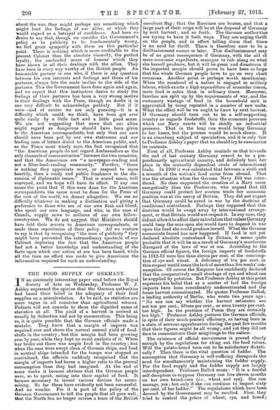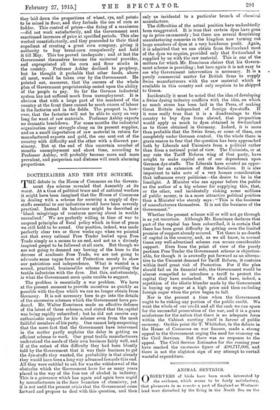THE FOOD SUPPLY OF GERMANY.
IN an extremely interesting paper read before the Royal Society of Arts on Wednesday, Professor W. J. Ashley expressed the opinion that the German authorities had based their belief in the adequacy of their food supplies on a miscalculation. As he said, no statistics are more vague in all countries than agricultural returns. Pedants will not concede to them the dignified name of statistics at all. The yield of a harvest is arrived at usually by deduction and not by enumeration. This being so, it is quite possible that the German officials made a mistake. They knew that a margin of imports was required over and above the normal annual yield of food- stuffs in the country ; but this margin had been growing year by year, while they kept no exact analysis of it. When war broke out there was ample food its the country ; but when the seas were swept clean of German ships, and food in neutral ships intended for the troops was stopped as contraband, the officials suddenly recognized that the margin of imports had borne a higher ratio to the general consumption than they bad imagined. At the end of some weeks it became obvious that the German people were, so to speak. eating into their capital of food. It became necessary to invent various devices for econo- mizing. So far these have evidently not been successful. And no wonder. For it is part of the policy of the German Government to tell the people that all goes well ; that the North Sea no longer carries a trace of the British
merchant flag; that the Russians are beaten, and that a large part of their crops will be at the disposal of Germany by next harvest; and so forth. The German authorities are trying to have it both ways. They are urging thrift on the people, and in effect telling them that there is no need for thrift. There is therefore sure to be a disillusionment sooner or later. This disillusionment may be of no great consequence if Germany, with the aid of more economic expedients, manages to rub along on what she herself produces, but it will be great and disastrous if the imported margin should prove to have been so large that the whole German people have to go on very short commons. Another point is perhaps worth mentioning. When the manhood of a nation is engaged in military labour, which exacts a high expenditure of muscular tissue, more food is eaten than in ordinary times. Moreover, families are split up by the requirements of war, and the customary wastage of food in the household unit is aggravated by being repeated in a number of new units. What the effect will be we ought to know by next harvest. If Germany should turn out to be a self-supporting country as regards foodstuffs, then the economic pressure which our Navy exerts will be chiefly an industrial pressure. That in the long run would bring Germany to her knees, but the process would be much slower. It is an absorbing subject of speculation, and it is only fair to Professor Ashley's paper that we should try to summarize its contents.
First of all, Professor Ashley reminds us that towards the end of last century Germany ceased to be a pre- ponderantly agricultural country, and definitely took her place in the mutually dependent circle of international trade. In 1900 it was calculated that between a sixth and a seventh of the nation's food came from abroad. That was the situation when the German Navy Bill was intro- duced. No class supported the creation of. a Navy more energetically than the Professors, who argued that till Germany could protect her oversew trade her economic position was at the mercy of Britain. They did not expect that Germany could be saved in war by the doctrine of conditional contraband. Perhaps they supposed that this doctrine would be swept away by international arrange- ment, or that Britain 'you'd not respect it. In any case, they did not allow it to affect their calculation that unless Germany could keep the seas open she would have to depend in war upon the food she could produce herself. What the German economists feared has now happened. If food is not yet declared absolute contraband by Britain, it seems quite probable that it will be as a result of Germany's murderous disregard of the laws of war at sea. According to the German official figures, the foreign imports of foodstuffs in 1912-13 were less than eleven per cent. of the consump- tion of rye and wheat. A deficiency of ten per cent. in this respect would mean the lack of more than five weeks' con- sumption. Of course the Emperor has confidently declared that the comparatively small shortage of rye and wheat can be supplied by potatoes. But Professor Ashley at this point expresses his belief that as a matter of fact the foreign imports have been considerably underestimated and the home harvest overestimated. He quotes Professor Balled. a leading authority of Berlin, who wrote two years ago "No one can say whether the harvest estimates are not ten per cent., fifteen per cent., or even twenty per cent. too high. In the province of Posen they are certainly too high." Professor Ashley pictures the German officials, in spite of their much-praised efficiency, as having been in a state of nervous apprehension during the past few mouths that their figures might be all wrong ; and yet they did not dare to communicate their misgivings to the nation.
The existence of official nervousness is proved clearly enough by the regulations for eking out the food values. Will the potato-bread turn out to be satisfactory dieteti- cally? Then there is the vital question of fodder. The assumption that Germany is self-sufficing disregards the need for simultaneously maintaining the fodder supply. For the food supply and the fodder supply are largely interdependent. Professor Balled wrote : " It is a fearful self-deception to suppose Germany can live eleven months on her own bread-corn (i.e., wheat and rye). She can manage, yes ; but only if she can continue to import sixty per cent. of her fodder." The regulations which have been decreed by the Government may be recalled. First, they tried to control the -prices of wheat, rye, and bread; they laid down the proportions of wheat, rye, and potato to be mixed in flour, and they forbade the use of corn as fodder. This control of prices—the fixing of a maximum —did not work satisfactorily, and the Government next. sanctioned increases of price at specified periods. This also worked unsatisfactorily, and they proceeded to their third expedient of creating a great corn company, giving it authority to buy bread-corn compulsorily and hold it till May. This too proved inadequate ; and at last the Government themselves became the universal provider, and expropriated all the corn and flour stocks in the country. Professor Ashley declined to prophesy, but he thought it probable that other foods, above all meat., would be taken over by the Government. He pointed out, moreover, that the success of the whole plan of Government proprietorship rested upon the ability of the people to pay. So far the German industrial system has not suffered much from unemployment. It is obvious that with a large part of the manhood of the country at the front there cannot be much excess of labour in the factories and in the fields. The prospect is, how- ever, that the factories will not be able to carry ou very long for want of raw materials. Professor Ashley expects no dramatic breakdown. For some months the industrial organization may struggle along on its present supplies, widen a small importation of raw material in return for manufactured exports and gold, the one sent out of the country with difficulty and the other with a discreet par- simony. But at the end of this uncertain number of months unemployment and short time, according to Professor Ashley, will probably become more and more prevalent, ana pauperism and distress will reach alarming proportions.



































 Previous page
Previous page